高中英语情态动词表推测
情态动词表推测完全总结

情态动词有can, could, may, might, must, have to, ought to, need, dare, shall, will, should, would, be able to,及半情态动词be to do, had better等16个。
have to, need, dare, shall, be able to,be to do, had better等7个不用于表推测。
2)表示否定的猜测时can't / couldn't语气最强,指“不可能”;may / might not语气最弱,意思是“可能不”。 3)一些情态动词表猜测时的用法限制。 must只用于肯定句; may/ might一般不用于疑问句; could可用于各种句式; 而can多用于否定句、疑问句,用于肯定句时,多指“客观可能性”。 如: Lightning can be very dangerous.闪电可能会非常危险。
must, will, would, ought to, should, can, could, may, might等9个都可用于表推测。
情态动词表推测用法总结
除了can只用于现在或过去时间外,其它各词都可以对过去、现在或将来的情况,做出语气强弱不同的猜测。
02
03
04
05
①He may/ might come tomorrow. 明天他可能会来。(将来) ②He may/ might know it. 他可能知道这事。(现在) ③He may/ might be waiting for you now. 他可能正在等你。(现在进行) ④He may/ might be waiting for you when you get there tomorrow. 明天你到那里时,他可能会在等着你。(将来进行)
情态动词表示推测
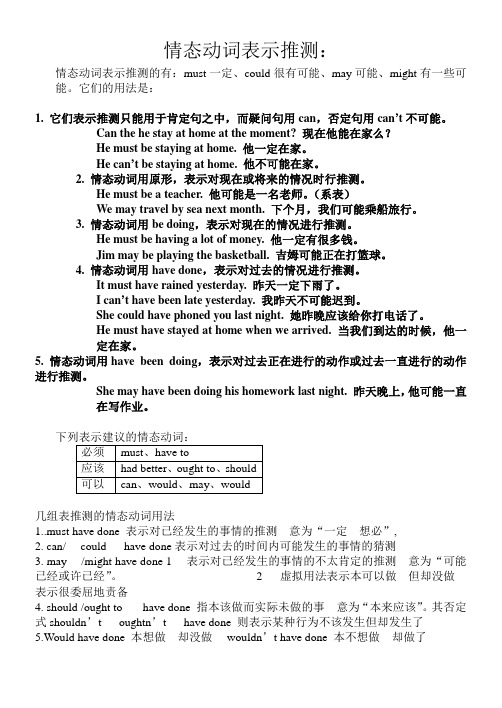
情态动词表示推测:情态动词表示推测的有:must一定、could很有可能、may可能、might有一些可能。
它们的用法是:1. 它们表示推测只能用于肯定句之中,而疑问句用can,否定句用can’t不可能。
Can the he stay at home at the moment? 现在他能在家么?He must be staying at home. 他一定在家。
He can’t be staying at home. 他不可能在家。
2. 情态动词用原形,表示对现在或将来的情况时行推测。
He must be a teacher. 他可能是一名老师。
(系表)We may travel by sea next month. 下个月,我们可能乘船旅行。
3. 情态动词用be doing,表示对现在的情况进行推测。
He must be having a lot of money. 他一定有很多钱。
Jim may be playing the basketball. 吉姆可能正在打篮球。
4. 情态动词用have done,表示对过去的情况进行推测。
It must have rained yesterday. 昨天一定下雨了。
I can’t have been late yesterday. 我昨天不可能迟到。
She could have phoned you last night. 她昨晚应该给你打电话了。
He must have stayed at home when we arrived. 当我们到达的时候,他一定在家。
5. 情态动词用have been doing,表示对过去正在进行的动作或过去一直进行的动作进行推测。
She may have been doing his homework last night. 昨天晚上,他可能一直在写作业。
几组表推测的情态动词用法1..must have done 表示对已经发生的事情的推测 意为“一定 想必”,2. can/ could have done表示对过去的时间内可能发生的事情的猜测3. may /might have done 1 表示对已经发生的事情的不太肯定的推测 意为“可能已经或许已经”。
情态动词表示推测的用法
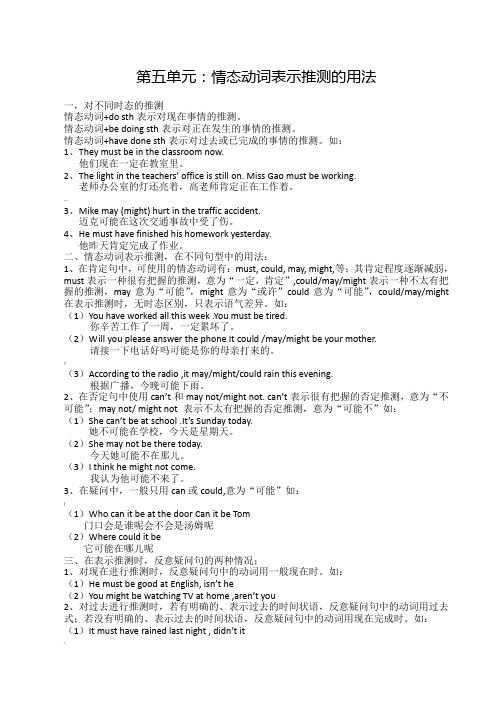
第五单元:情态动词表示推测的用法一,对不同时态的推测情态动词+do sth表示对现在事情的推测。
情态动词+be doing sth表示对正在发生的事情的推测。
情态动词+have done sth表示对过去或已完成的事情的推测。
如:1、They must be in the classroom now.他们现在一定在教室里。
2、The light in the teachers’ office is still on. Miss Gao must be working.老师办公室的灯还亮着,高老师肯定正在工作着。
…3、Mike may (might) hurt in the traffic accident.迈克可能在这次交通事故中受了伤。
4、He must have finished his homework yesterday.他昨天肯定完成了作业。
二、情态动词表示推测,在不同句型中的用法:1、在肯定句中,可使用的情态动词有:must, could, may, might,等;其肯定程度逐渐减弱,must表示一种很有把握的推测,意为“一定,肯定”,could/may/might表示一种不太有把握的推测,may意为“可能”,might意为“或许”could意为“可能”,could/may/might 在表示推测时,无时态区别,只表示语气差异。
如:(1)You have worked all this week .You must be tired.你辛苦工作了一周,一定累坏了。
(2)Will you please answer the phone It could /may/might be your mother.请接一下电话好吗可能是你的母亲打来的。
?(3)According to the radio ,it may/might/could rain this evening.根据广播,今晚可能下雨。
Unit13__语法解析-情态动词表推测
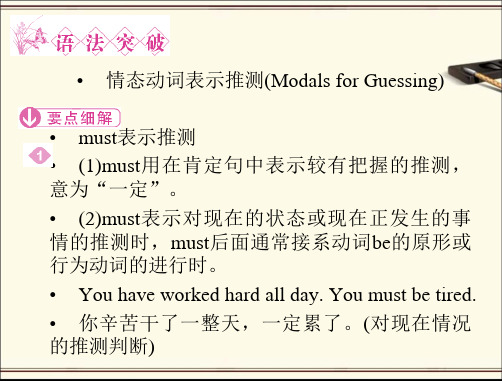
• (3)can/could + have +过去分词:表示对过 去某种行为或存在的状态的怀疑或不肯定 推测。 can 常用于否定句 ( 意思是“不可能 已经”)和疑问句;could除用于否定句及疑 问句外,还可用于肯定句(意思是“那时可 能;本来可以”)。 • Don’t worry—they would have just forgotten to phone. • 别担心——他们很可能只是忘了打电话。 • Where can he have gone? • 他可能去哪里了呢?
• 10.—I didn’t go to work yesterday because my car broke down. • —You ________ mine. I wasn’t using it then. • A.might borrow B.could have borrowed • C.must have borrowed D.ought to borrow • 解析: could have done可表示与过去事实相反 的虚拟语气,意为“本应该 …… 的 ( 而实际上没 做)”,从句意为“你本来是可以借我的车,因为 我当时不用它”可知正确答案。 • 答案: B
• (3) 情态动词+动词完成时。表示对过去情况的推
测。
• The road is wet.It must have rained last night. • 地是湿的,昨天晚上一定下雨了。
• (4) 情态动词+动词的现在完成进行时。表示对过
去正在发生事情的推测。
• Your mother must have been looking for you.
• 9—There’s someone outside. Who ____ it be? • —It must be Mary. She promised to come over at 8∶00. • A.must B.can • C.shall D.need • 解析: can 表示推测可用在疑问句和否定句中, 而 must 用于肯定句中, shall 和 need 无猜测的用法。 • 答案: B
(完整版)情态动词表推测归纳

情态动词表推测归纳一、can/couldcan和could没有时态上的区别,只是表示可能性的大小,can表示的可能性比could大。
(1)对现在或将来动作或状态的推测The shy girl can’t (couldn’t) be our monitor.这位害羞的女孩不可能当我们的班长。
(2)对过去事实的推测can (could)+have+动词过去分词,表示推测过去某动作“可能”发生了,或者表示过去某动作有可能发生,但未发生,意为“本来可以……”。
can’t (could’t)+have+动词过去分词,表示推测过去动作一定没有发生。
He’s an hour late, and the bad weather can have delayed him.他迟到了一小时,可能是恶劣的天气使他耽误了。
The road isn’t wet. It couldn’t have rained last night.路面没有湿,昨天晚上肯定没下雨。
二、may/might(1)对现在或将来动作或状态的推测She may (might) be washing her clothes.她可能正在洗衣服。
(2)对过去事实的推测A.may/might+have+动词的过去分词,表示推测过去某动作“也许”发生了;might+have+动词的过去分词,表示推测的语气更加委婉。
He says that she may/might have misunderstood him.他说她可能误解他了。
B.may/might+have+been+动词的现在分词,表示推测过去某动作是否正在进行或一直在进行。
He may/might have been buying stamps when you saw him.你看见他时他可能正在买邮票。
三、must(1)对现在动作或状态的肯定推测“must+动词原形”和“must+be+动词现在分词”表示对现在动作或状态的肯定推测;“can’t+不带to的不定式”,表示对现在动作的否定推测,意为“一定没有……”。
解析情态动词表推测

解析情态动词表推测情态动词表推测的三种时态如下:1、对将来情况的推测,用“情态动词+动词原形”。
(1)She must / may / might / could arrive before 5.5:00前她一定/可能/也许到。
2、对现在或一般情况的推测,用“情态动词+be”,“情态动词+be doing”或“情态动词+动词原形”。
(1)He must/may/might/could be listening to the radio now.他一定/可能/也许正在听收音机。
(2)He can't(couldn't)/may(might) not be at home at this time.这个时候他不可能/可能不在家。
3、对过去情况的推测,用“情态动词+ have +过去分词”。
It must/may/might/could have rained last night.The ground is wet.地湿了,昨晚肯定/可能/也许下雨了。
情态动词表推测可能性大小的排列情态动词有must,can/could may/might,can't/couldn't。
表示推测的情态动词有must,can,could,may,might 等,且语气由左向右依次减弱。
could,might并不一定是can,may的过去式,有时只是语气分别比can,may更弱。
常见的表示推测的情态动词:must, could, may, might, may not, can’t1) 表示肯定推测时,可能性:must一定>could 可能>may也许>migh也许,表示对现在发生的事的推测例如:It is 9:00 p.m. She must be at home. 晚上九点了。
她现在一定在家。
注意:must只用于肯定句如果表示“一定不”,用can’t:She can’t be at home. 她一定不在家。
高中英语情态动词表推测

can 和could 表示能力的用法
• can 表示现在的能力,could 表示过去的能力,要表示 将来具备的能力通常 be able to 的将来时态。其中要注 意的是,could 表示过去的能力,通常只用于表示过去 一般性能力,而不表示过去具体某次特定情形下能够做 某事的能力。如: • 他学习很努力,所以考试能及格。 • 误:He studied hard and could pass the exam. • 正:He studied hard and was able to pass the exam. • 注:若在否定句中没有以上限制,即couldn’t 可表 示过去特定情况下的能力,如可说 He studied hard but still couldn’t pass the exam.
• 他一定去过上海。
must和 to的用法 must和have to的用法
•
• 5. 表示一种与说话人 愿望相反、不耐烦的感情色彩,偏 偏、非要。 • Why must you always bother me ? • 为什么你总是来烦我?
课程内容 1.句式 2.时态 3. can 和could 表示推测的 用法 4.特点 特点 5.用法 用法
句式1
• 1.在肯定句中一般用 在肯定句中一般用must (一定 ,can, 一定), 在肯定句中一般用 一定 could(可能), ),might /may(也许,或 (可能), (也许, 许)。 • (1)He must/can/may,might know ) the answer to this question. • 他一定/可能 可能/也许知道这个问题的答案 他一定 可能 也许知道这个问题的答案 。 • (2)It is cold in the room. They ) must have turned off the heating.
高中英语 语法 情态动词表推测的用法共36张

◎注意动词 dare 的某些特殊用法。 1)在下列句子中只可用情态动词dare,不 可用行为动词dare How dare you say I am unfair? I dare say,…. (**I dare to say, … X )
e.g., Don’t worry, sir. I dare say, nobody will come again.
6. David, you _____play with the valuable
bottle, you_______ break it.
A. won`t; can`t
B. mustn`t; may
C. shouldn`t; must D. can`t; shouldn`t
7. Susan refuses to marry Jack now. She ______her mind. A. must change B. should have changed
A. I must
B. I should
C. I will
D. I can
14. My sister met him at the Grand Theatre yesterday afternoon, so
he _A__ your lecture.
A. couldn’t have attended B. needn’t have attended C. mustn’t have attended D. shouldn’t have attended
It must have rained last night, didn`t it? (过去)昨晚一定下雨了,是不是?
You must have learned English for many years, haven`t you? (完成时)你一定学 了好多年英语,是吗?
表推测的情态动词及其用法
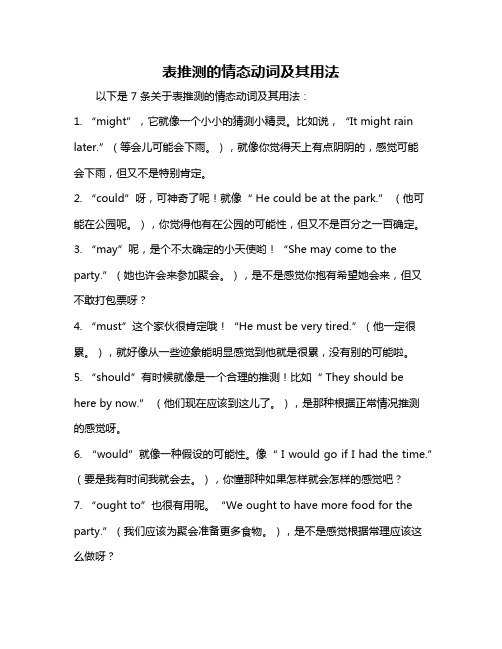
表推测的情态动词及其用法以下是 7 条关于表推测的情态动词及其用法:1. “might”,它就像一个小小的猜测小精灵。
比如说,“It might rain later.”(等会儿可能会下雨。
),就像你觉得天上有点阴阴的,感觉可能会下雨,但又不是特别肯定。
2. “could”呀,可神奇了呢!就像“ He could be at the park.” (他可能在公园呢。
),你觉得他有在公园的可能性,但又不是百分之一百确定。
3. “may”呢,是个不太确定的小天使哟!“She may come to the party.”(她也许会来参加聚会。
),是不是感觉你抱有希望她会来,但又不敢打包票呀?4. “must”这个家伙很肯定哦!“He must be very tired.”(他一定很累。
),就好像从一些迹象能明显感觉到他就是很累,没有别的可能啦。
5. “should”有时候就像是一个合理的推测!比如“ They should behere by now.” (他们现在应该到这儿了。
),是那种根据正常情况推测的感觉呀。
6. “would”就像一种假设的可能性。
像“ I would go if I had the time.” (要是我有时间我就会去。
),你懂那种如果怎样就会怎样的感觉吧?7. “ought to”也很有用呢。
“We ought to have more food for the party.”(我们应该为聚会准备更多食物。
),是不是感觉根据常理应该这么做呀?我觉得啊,这些情态动词让我们的表达更丰富、更灵活,能更好地传达我们心中那种不确定或者推测的感觉,真是太奇妙啦!。
高中英语知识点归纳情态动词的用法与推测技巧
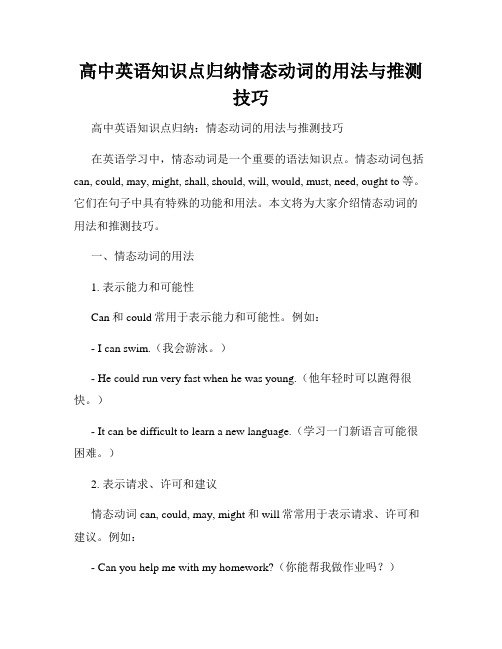
高中英语知识点归纳情态动词的用法与推测技巧高中英语知识点归纳:情态动词的用法与推测技巧在英语学习中,情态动词是一个重要的语法知识点。
情态动词包括can, could, may, might, shall, should, will, would, must, need, ought to等。
它们在句子中具有特殊的功能和用法。
本文将为大家介绍情态动词的用法和推测技巧。
一、情态动词的用法1. 表示能力和可能性Can和could常用于表示能力和可能性。
例如:- I can swim.(我会游泳。
)- He could run very fast when he was young.(他年轻时可以跑得很快。
)- It can be difficult to learn a new language.(学习一门新语言可能很困难。
)2. 表示请求、许可和建议情态动词can, could, may, might和will常常用于表示请求、许可和建议。
例如:- Can you help me with my homework?(你能帮我做作业吗?)- Could I borrow your pen?(我能借用你的钢笔吗?)- May I ask a question?(我可以提问吗?)- You should go to bed early.(你应该早点睡觉。
)3. 表示推测和可能性情态动词may, might, could和must用于表示推测和可能性。
例如:- He may be at home.(他可能在家。
)- She might pass the exam.(她也许会通过考试。
)- It could rain tomorrow.(明天有可能下雨。
)- He must be tired after running for so long.(他跑了这么久肯定累了。
)4. 表示义务和建议情态动词must和should常常用于表示义务和建议。
情态动词must。can。could。may。might表推测的用法

情态动词must。
can。
could。
may。
might表推测的用法情态动词can / could表示推测时,意思是“可能、有可能”,语气比must弱。
XXX用于现在和将来,could用于过去。
1)表示可能性时,can / could后面接动词原形。
He canbe American。
= It is possible that he is American.他可能是个美国人。
2)表示不可能性时,用XXX。
He can`t be American。
=It is impossible that he is American.他不可能是个美国人。
3)can / could还可以表示“会、能够”的意思。
He can speak Chinese.他会说中文。
4)在疑问句中,XXX表示请求、允许、建议等意义。
Can you help me?你能帮我吗?Could you please pass me the salt?你能把盐递给我吗?3.may / might的用法1)may / might表示推测时,意思是“可能性很小”,语气比can / could更弱。
He may be American。
= It is possible thathe is American。
but the possibility is small.他可能是个美国人,但可能性很小。
2)may / might还可以表示请求、许可、建议等意义。
May I use your phone?我可以用你的电话吗?Might I suggest a different approach?我可以建议一种不同的方法吗?3)在虚拟语气中,XXX表示“可能性很小,甚至不可能”,表示一种假设的情况。
If I had studied harder。
I might have passed the exam.如果我学得更努力,我可能会通过考试。
总之,情态动词must。
情态动词表推测完全总结

使用不当的情态动词表推测
总结词
使用不当的情态动词表推测是常见的错误,如使用 "will"来表示未来的可能性。
详细描述
情态动词中,"will"通常表示未来的事实或确定性,而 不是可能性。在表示推测时,应使用其他情态动词, 如"may"、"might"、"could"、"can"、"should"、 "ought to"、"likely"、"probable"、"possible"等。
01
用于否定推测的常用情态动词有 “can't”、“couldn't”、 “shouldn't”。
02
表示对过去、现在或将来的情况 作否定推测,通常与完成时态或
将来时态连用。
用于否定推测时,语气从强到弱 依次为“can't > couldn't > shouldn't”。
03
例句:She can't have left already.(她不可能已经离开了。)
语境理解错误导致的误用
要点一
总结词
语境理解错误导致的情态动词误用是常见的错误,如根据 不充分的信息做出过于肯定的推测。
要点二
详细描述
在使用情态动词表推测时,应充分考虑语境和信息来源的 可靠性。如果信息不充分或不可靠,应谨慎使用情态动词 ,避免做出过于肯定的推测。同时,应注意区分客观事实 和主观猜测,避免将主观猜测表达为客观事实。
will/would 表推测
总结词
表示基于现有信息对未来的推测。
情态动词表推测

1. --Are you coming to Tom’s party ?--I’m not sure .I ________ go to the concert instead A. must B. would C. should D. might2. Peter ______come with us tonight, but he isn’t very sure.A. mustB. mayC. canD. will3. Hurry up, our teacher _____for us at the school gate.A. must be waitingB. must waitC. might waitD. can be waiting4. You have done so much work, you __________ rather tired.A. must be feelingB. could be feltC. may be feelingD. would feel5. She doesn't answer the doorbell, she _____ be asleep.A. canB. mightC. must haveD. should6. Naturally, after I told her what to do, my daughter ______ go and do the opposite!A. mayB. canC. mustD. should7.-- Is there a flight to Paris this evening?--There _______be. I’ll phone the airport and find it out.A. mustB. wouldC. mightD. can8. ---I’ve taken someone else’s green sweater by mistake.---It______ Harry’s. He always wears green.A. has to beB. wi ll beC. mustn’tD. could be9.Very loud noises __________ make people ill, hurt their ears or even drive them mad.A. mustB. needC. canD. should10. Even experienced teachers ________ make mistakes.A. mustB. canC. shouldD. might11.The temperature______ sometimes reach 35℃ in July.A. mustB. shallC. shouldD. can12.Too much love ________ sometimes be bad.A. mustB. shallC. shouldD. can13.Sometimes he is very friendly, but at other times he ____ behave coldly.A. canB. mustC. willD. shall.(二)(否定句式)1. Mr. Li _____be in Beijing because I saw him in town only a few minutes ago.A. needn'tB. can'tC. shouldn'tD. mustn't2. It _____be Li Ming who took my dictionary away.It be Zhang Hua who did it.A. can't;mustB. mustn't;mustC. needn't;canD. may not;can3. ---- Is John coming by train?---He should, but he _______ not. He likes driving his car.A. mustB. canC. needD. may4. ---I heard they went skating in the mountains last winter.---- It _____ true because there was little snow there.A. may not beB. won't beC. couldn't beD. mustn't be5. It _____ be she that told him about it; it ____ be you, because only you and I know it.A. mustn’t; mustB. couldn’t ; mustC. mustn’t mightD. couldn’t; might6. A hardworking man _____ become a great scientist, but a great scientist ____ be a hardworking man.A. can’t; canB. may not; canC. can’t; mustD. may not; must7. You ______ be tired; you have been working for so long a time, but he _______ be tired;he has just begun to work.A. may not; mustB. must; may notC. can’t; mustD. must; can’t8. --- Isn’t that Ann’s husband ove r there?--- No, it ______ be him---I’m sure he doesn’t wear glasses.A. can’tB. must notC. won’tD. may not(三)(疑问句式)1. --- Someone is knocking at the door. Who it be?--- It be Tom. He is still in the school.A. can, can'tB. can, mustn'tC. might, couldD. might, may2. _______it be true that Albert passed the test in geography?A. MayB. ShouldC. CouldD. Would3. Mr. Bush is on time for everything. How ____ it be that he was late for the opening ceremony?A. canB. shouldC. mayD. must4.How ____ you say that you really understand the whole story if you have covered onlypart of the article?A. canB. mustC. needD. may5. My English-Chinese dictionary has disappeared . Who ________ have taken it ?A. shouldB. mustC. couldD. would6.I can’t find Dr. Lopez anywhere in the office building. Where _______ he have gone ?A. mustB. canC. shouldD. need7. See who is there! ______ it be May?A. MayB. MustC. CanD. Will(四)(should表猜测)1. It’s nearly seven o’clock . Jack _______ be here at any moment .A . must B. need C. should D. can2.--- When can I come for the photos? I need them tomorrow afternoon.---They __________ be ready by 12:00.A. canB. shouldC. mightD. need3.There______be any difficulty about passing the driving test since you have practised a lot in the driving schoolA mustn'tB shan'tC shouldn'tD needn't4.It’s said that there are plenty of hotels in that town. There ___ be any difficulty for you to find somewhere to stay.A. wouldn’tB. mustn’tC. shouldn’tD. needn’t(五)(表推测的情态动词+have done)1. John's score on the test is the highest in the class; he____ last night.A) should study B) should have studiedC) must have studied D) must have to study2. The room is in a terrible mess; it ____cleaned.A) can't have been B) shouldn't have beenC) mustn't have been D) wouldn't have been3. Nobody knows how people first came to these islands. They ____ from South America on rafts.A) must have sailed B) can sail C) might have sailed D) should have sailed4. Mary was not in her bedroom yesterday afternoon. She ____ in her classroom.A) should have been B) must have been C) must be D) should be5.She can speak quite fluent English. She____.A) must be in the U.S.A. for some time B) must have been in the U.S.A. for some timeC) should have been in the U.S.A. for some time D) may be in the U.S.A. for some time6. Mary ____my letter, otherwise she would have replied before now.A) should have received B) has receivedC) couldn't have received D) ought to have received7.Jack __________yet, otherwise he would have telephoned me .A. mustn’t have arrivedB. shouldn’t have arrivedC. can’t have arrivedD. needn’t have arrived8.---“Where ____ my umbrella?” ---“Somebody ____ it away by mistake.”A) is, must have taken B) is, must take C) have been, must take D) is, takes9. He ____the 9:20 train because he didn't leave home till 9:25.A) can reach B) could catch C) may not catch D) couldn't have caught10. --- The woman biologist stayed in Africa studying wild animals for 13 years before she returned.--- Oh, dear! She _______ a lot of difficulties!A. may go throughB. might go throughC. ought to have gone throughD. must have gone through11.---Tom is never late for work. Why is he absent today ?---Something ______to him.A. must happenB. should have happenedC. could have happenedD. must have happened12.Where is my pen ? I ___________it .A. might loseB. would have lostC. should have lostD. must have lost13. I didn't see her in the meeting-room this morning. She at the meeting.A. mustn't have spokenB. shouldn't have spokenC. needn't have spokenD. couldn't have spoken14.We didn't see Tom at the meeting yesterday. He it.A. mustn't have attendedB. cannot have attendedC. needn't have attendedD. would have not attended15. ---What has happened to George ?---I don't know. He _____ lost.A. can have gotB. may have go tC. might getD. could get16. The streets are all wet;It _____ rained heavily last night.A. shouldB. should haveC. mustD. must have17. ---There were already five people in the car but they managed to take me as well.---It __________ a comfortable journey.A. c an’t beB. shouldn’t beC. m ustn’t have beenD. couldn’t have been18. Sorry I’m late, I _______turned off the alarm clock and gone back to sleep again.A. might have turnedB. should have turnedC. can turnD. will turn19. He left yesterday, so he __________ in Beijing.A. may arriveB. may have arrivedC. must arriveD. arrives(六)(表猜测的反意疑问句)1. He must have finished the work, _____ he?A .mustn’t B.needn’t C. hasn’t D. didn’t2. He must have finished the work two years ago, _______he?A .mustn’t B.needn’t C.hasn’t D. didn’t3. He must be a student, _____ he?A .mustn’t B.needn’t C. hasn’t D. isn’t4. He must have been scolded by his father last night, ______?A. mustn’t heB. haven’t heC. wasn’t heD. didn’t he5. Tom must have learned Chinese for several years,_____ he?B. hasn't D. don't6. He can’t be her father, _____ he? A. is B. isn’t C. can D. can’t7. Mr Smith ca n’t have solved all his problem,_____?A. can heB. can’t heC. hasn’t heD. has he。
高一英语 必修二 UNIT 1 语法 情态动词表推测
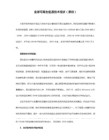
—Something ________ to him. (2005年江西卷)
A. must happen B. should have happened
5. I have lost one of my gloves. I _______ it somewhere.(2005年北京春季卷)
A. must drop B. must have dropped C. must be dropping D. must have been dropped
9. — It’s the office! So you ______ know eating is not allowed here.
— Oh, sorry.
A. must B. will C. may D. need
10. —Do you know where David is? I couldn't find him anywhere.
必修二 unit 1 语法—情态动词表示推测
情态动词的作用很多但大致分成三大类:使用情态动词本义,表示推测,表示虚拟(责备)。关于情态动词的总结我将从这三方面进行总结。
一, 情态动词表推测:
对现在对将来推测: may/might have done 过去可能
may/ might + V. 可能 can’t/couldn’t have done 过去不可能 must + V. 肯定 must have done 过去一定
— No, it _______ be him I'm sure he doesn't wear glasses. (2004年全国卷Ⅰ)
情态动词的推测与推测表达猜测和推测的方式

情态动词的推测与推测表达猜测和推测的方式情态动词在英语中用于表达推测和猜测的意思,帮助我们表示可能性、准确性和推测性。
本文将探讨情态动词的常见用法和推测表达方式。
一、情态动词的介绍情态动词是一类特殊的助动词,不能单独使用,必须与实义动词一起构成句子的谓语部分。
英语中最常见的情态动词有can, could, may, might, must, shall, should, will, would等。
二、推测的表示方式1. 可能性推测情态动词can和could常用于表示对可能性的推测。
例如:- She can be at home now. (她现在可能在家。
)- He could have forgotten his keys. (他可能忘记了钥匙。
)2. 可能的否定推测情态动词can't和couldn't可以用于表示对不可能性的推测。
例如:- He can't be a doctor. (他不可能是个医生。
)- She couldn't have finished the book in one day. (她不可能一天内看完那本书。
)3. 可能性推测(不确定性)情态动词may和might可以用于表示对可能性的推测,但带有不确定性。
例如:- She may be busy. (她可能忙。
)- They might arrive late. (他们可能会迟到。
)4. 肯定推测(推测准确性)情态动词must用于表示对推测的高度确定性。
例如:- He must be sleeping. (他一定在睡觉。
)- It must have rained last night. (昨晚一定下雨了。
)三、其他推测表达方式除了使用情态动词外,也可以使用一些其他的表达方式来表示推测和猜测。
1. 使用副词和短语- It seems that... (看起来好像...)- It looks like... (看起来像是...)- I guess... (我猜...)- I suppose... (我想...)2. 使用过去时态和完成时态有时,可以通过使用过去时态和完成时态来表示对过去的推测和猜测。
情态动词表推测
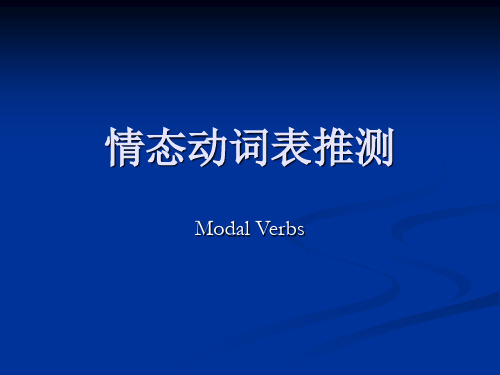
______ be at home. can’t 4. --Is this Lan Qiang’s boxing glove? --Is --Yes, it must be his. This’s his name on the back. --Yes, ____ may/might/could 5. You’d better take an umbrella. It ______________ rain this afternoon. must 6. It’s the library! So you ____ know shouting is not allowed here. 7. --Have you decided where to spend your summer --Have holiay? ma --Not yet. We ____ go to Qingdao. --Not y us a speech this evening? 8. --Is Jessica giving --Is --No, it can’t be her. She has been to Japan. --No, ____
9. --What will the weather be like tomorrow? --What --It _____ be rainy, cloudy or sunny. Who knows? --It might must 10. You _____ be tired after playing sports for a long time without a rest. 11. --Can I tell Peter about the news? --Can --No, I don’t want anyone else to know it. You --No, don’ must ____ keep it to yourself. 12. --Marry, I have cleaned the room for you. --Marry, --Thank you. Youneedn’t have --Thank ______________ it. I could manage it myself. done
表推测的情态动词

A
“情态动词+have done” 的用法。
B
must have done “过 去一定做了某事”
C
表示对过去的一种肯定性 推测。
D
eg. She must have gone by bus.
E
It must have rained last night, for
F
the road is quite muddy.
二.can/could have+done“过去可能 做了某事”, “could have+done”也可表示‘‘过去本可以做某事但实际上却没
有做” eg. He was not at home last night, he could have gone to the cinema. I could have finished my homework last night, but I was too sleepy.
ought to/should h a ve d on e ,” 表 示 本 应该做某事,而事实 上并没有做”。
○ 否定句表示“ 本不 该做某事而实际上 做了”。
○ 你在实验中本应该 更仔细些的
You ou g h t to/should have been more careful in this experiment.
Hale Waihona Puke 1“can/could not +have + done”“过去
03 她 不 可 能 去 你 家 , 她 不 知 道 你 的 地 址 。
05 h o u s e ; s h e d o e s n o t k n o w yo u r
02 不 可 能 做 了 某 事 ”
04
推测的情态动词
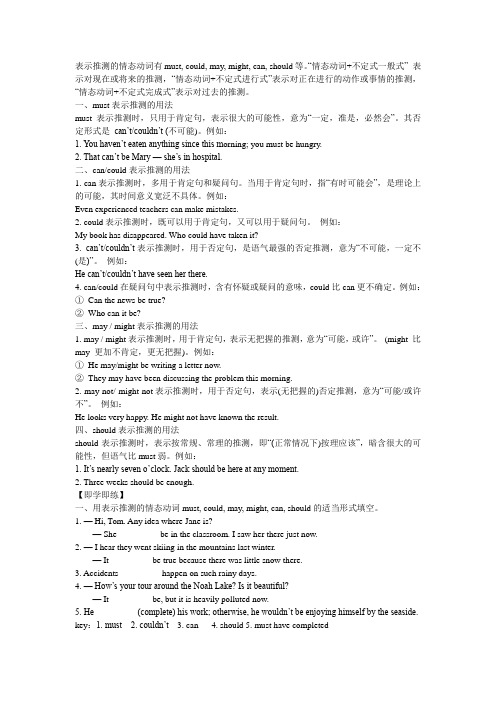
表示推测的情态动词有must, could, may, might, can, should等。
“情态动词+不定式一般式” 表示对现在或将来的推测,“情态动词+不定式进行式”表示对正在进行的动作或事情的推测,“情态动词+不定式完成式”表示对过去的推测。
一、must表示推测的用法must表示推测时,只用于肯定句,表示很大的可能性,意为“一定,准是,必然会”。
其否定形式是can’t/couldn’t (不可能)。
例如:1. Y ou haven’t eaten anything since this m orning; you must be hungry.2. That can’t be Mary —she’s in hospital.二、can/could表示推测的用法1. can表示推测时,多用于肯定句和疑问句。
当用于肯定句时,指“有时可能会”,是理论上的可能,其时间意义宽泛不具体。
例如:Even experienced teachers can make mistakes.2. could表示推测时,既可以用于肯定句,又可以用于疑问句。
例如:My book has disappeared. Who could have taken it?3. can’t/couldn’t表示推测时,用于否定句,是语气最强的否定推测,意为“不可能,一定不(是)”。
例如:He can’t/couldn’t have seen her there.4. can/could在疑问句中表示推测时,含有怀疑或疑问的意味,could比can更不确定。
例如:①Can the news be true?②Who can it be?三、may / might表示推测的用法1. may / might表示推测时,用于肯定句,表示无把握的推测,意为“可能,或许”。
(might 比may 更加不肯定,更无把握)。
例如:①He may/might be writing a letter now.②They may have been discussing the problem this morning.2. may not/ might not表示推测时,用于否定句,表示(无把握的)否定推测,意为“可能/或许不”。
- 1、下载文档前请自行甄别文档内容的完整性,平台不提供额外的编辑、内容补充、找答案等附加服务。
- 2、"仅部分预览"的文档,不可在线预览部分如存在完整性等问题,可反馈申请退款(可完整预览的文档不适用该条件!)。
- 3、如文档侵犯您的权益,请联系客服反馈,我们会尽快为您处理(人工客服工作时间:9:00-18:30)。
情态动词表推测分类:我的资料2007.4.21 09:56 作者:crownmian | 评论:0 | 阅读:2269按照常规的学习习惯,人们总是一个一个地学习每个情态动词的各种用法。
但是,由于英语情态动词(modal verbs)是帮助谓语的主要动词表示说话人的情感和态度的动词,所以它们的意义比较难以捕捉,而且每个情态动词的用法都比较复杂,于是,情态动词的学习就成了普通英语学习者的一个难题。
在此笔者以表示“推断”的情态动词为例,提供一种横向思维模式的情态动词的学习方法,相信能帮助部分英语学习者解决这一难题。
一、must用来表示“推断”, 只用于肯定句中。
有“一定”、“准是”之义。
例如:--Do you know Ms. Wang likes walking after supper?--Sure. She must be walking around the campus now.表示对过去事情的推断要用must have done。
例如:It must have rained last night for it was wet in the street.二、can用来表示“推断”。
常用于否定句和疑问句中。
例如:She can’t be serious about it.What can they mean by saying that?In no country other than England, it has been said, can one experience four seasons in the course of a single day.Can有时也在肯定句中表示“推断”,说明逻辑上的可能性,而与事实无关。
例如:Just like all other currencies in the world, the pound can be devalued if necessary.和世界上的其它货币一样,如果有必要,英镑也可以贬值。
If it is raining tomorrow, the sports can take place indoors.在满足上述结构的条件下,表示对过去事情的推断要用can have done。
例如:The room is in such a terrible mess. It can’t have been cleaned as the landlady said.三、could可以用来表示对现在情况的“推断”,只可能性稍小一些而已。
Could表“推断”一般也只用于否定句和疑问句中。
Could有时也在肯定句中表示“推断”,说明逻辑上的可能性,而与事实无关。
例如:He could be very naughty when he was a child.In those days, a lot of scientists thought that the sun could go around the earth.和can一样,表示对过去事情的推断要用could have done。
例如:--I stayed at a hotel while in New York.--Oh, did you? You could have stayed with Barbara.(NMET98)四、should可以用表示对将来的推断。
意思是“必定会”。
例如:It’s nearly seven o’clock, Jack should be here at any moment.(NMET1995)--When can I come for the photos? I need them tomorrow afternoon.--They should be ready by 12:00.(NMET98)五、ought to表示推断,有“想必”、“非常可能”之义。
例如:--There is a lot of smoke coming out of the teaching building there.--Really? It ought to be a fire, most probably六、may表示推断,可以用于肯定句和否定句中,不能用于疑问句中。
表示的可能性不大。
例如:--Who can it be that is knocking at the door?--It may be father, but I’m not sure.七、might表示推断,也可以用于肯定句和否定句中,不能用于疑问句中。
表示的可能性很小,或者只是一种担心。
例如:--It’s getting cold.--Yes, I’m afraid it might be snowing tonight.又如:--Are you coming to Jeff’s party?--I’m not sure. I might go to the concert instead.(NMET2000)Might, may, could, should, ought to, would, will, must均可用来表示推断。
如果有人说:There’s someone at the door. Didn’t you hear the bell?回答可根据其推测的不同程度用(按程度排列):It might be George.(或许是乔治)It may be George.(可能是乔治)It could be George.(可能是乔治)It should be George.(必定是乔治)It ought to be George.(想必是乔治)It would be George.(该是乔治)It will be George.(该是乔治)It must be George.(一定是乔治)It is George.(是乔治)你可以通过这个链接引用该篇文章:/viewdiary.15672383.html情态动词表推测悬赏分:0提问时间:2006-6-4 11:44:00 - 阅读次数:57448.I was on the highway when this car went fast followed by a police car. They _____ at least 150 kilometers an hour.A. should have been doingB. must have been doingC. could have doneD. would have done答案是b,为什么,这四个答案区别是什么?站内搜索我要提问提问者:slfwings- 门童1级最佳答案:楼层: 1CD就可以排除了A。
应当…B。
一定…这儿应该用“一定……”而不是“应当……”回答者:didiwei - 门童1级- 提交时间:2006-6-4 15:54:000 0 点击左边的图片给他一个评价吧其他答案:共 1 条楼层: 2[思路分析]“情态动词+完成时”是历年高考的热点,在做此类练习时,既需要掌握这一结构的基本用法,又应该仔细体会题干所提供的语言信息,准确理解语言环境和说话人的含义,尤其要注意题干中时态给予的暗示。
must have done 表示对已经发生的事情的推测,意为“一定,想必”。
句子中表示的是一种肯定的推测,表示…他们肯定行驶速度为每小时150公里‟。
[解题过程]1. must have done 表示对已经发生的事情的推测,意为“一定,想必”。
这种结构一般只用于肯定句,其否定形式是can”t(couldn”t)have done ,表示“不可能,肯定不会”。
例如:He didn”t hear the phone . He must have been asleep.他没有听到电话响,他肯定是已经睡着了。
He must have been to Shanghai.他一定去过上海。
They can”t have gone out , because the light is on .他们不可能出去,因为灯亮着。
2. can(could)have done表示对过去的时间内可能发生的事情的猜测,can have done 一般只用于否定句和疑问句。
could have done 还可以用于肯定句,常用来表示本来可能完成而实际未完成的动作。
例如:He can”t have finished the work so soon.这项工作他不可能完成得这样快。
We could have walked to the station , it was so near .我们本来是可以走到车站去的,路很近。
3. may(might)have done 表示对已经发生的事情的不太肯定的推测,意为“可能已经,或许已经”。
例如:If we had taken the other road , we might have arrived earlier.如果我们选择另一条路,我们可能会到得早一些。
He might have given you more help , he was very busy .他本来是可以给你更多帮助的,尽管他很忙。
4. needn”t have done 指实际上做了本来不必要做的事,意为“本来不必”。
例如:There was plenty of time . She needn”t have hurried.时间很充裕,她本不必匆忙。
You needn”t have told him the news.他本来不必把这个消息告诉他。
5. should (ought to )have done 指本该做而实际未做的事,意为“本来应该”。
其否定式shouldn”t(oughtn”t)have done 则表示某种行为不该发生但却发生了。
例如:You should have started earlier , but you didn”t.你本应该早一点出发,但是你没有。
You ought to have helped him (but you didn”t). 你本应该帮助他。
We shouldn”t have waited for her because she never came.我们本不应该等她,因为她根本不会来。
